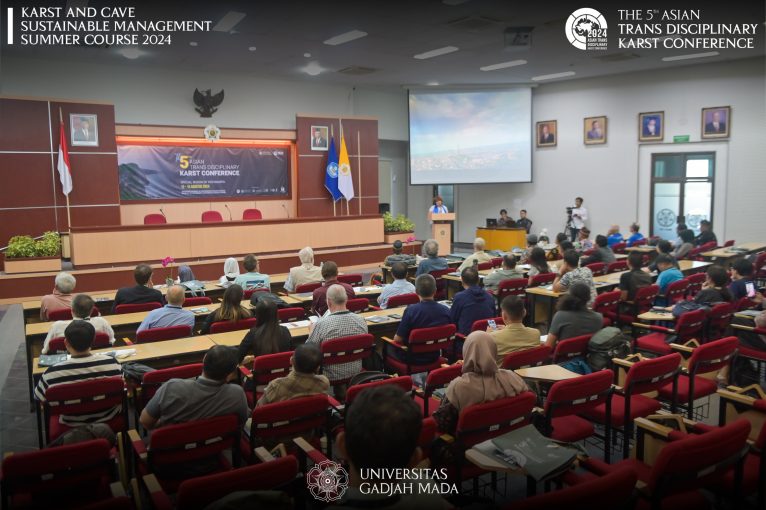
On August 12–14, 2024, the Environmental Science Program at Universitas Gadjah Mada (UGM) conducted the second Summer Course series. The 5th Asian Trans-Disciplinary Karst Conference 2024, an in-person follow-up to the previous online course, was attended by participants from over 15 countries. The event served as a platform for knowledge sharing, experience exchange, and direct international collaboration. The conference spanned three days and included seminars and panel sessions.
(International Conference Documentation)
The event was inaugurated by the Dean of the Graduate School and Prof. Dr. Eko Haryono, M.Si., the Chair of the Organizing Committee. The opening session continued with an introduction to the International Union of Speleology (UIS) by Prof. Nadja Zupan Hajna, followed by a presentation on the upcoming 19th International Congress of Speleology in Brazil, scheduled for July 20–27, 2025, delivered by Jose Ayrton Labegalini, Chair of the Congress Organizing Committee.
On the first day, the international conference featured plenary lectures and panel sessions. Keynote speakers from various countries presented in-depth expertise on karst and cave systems. George Veni, a professional geoscientist, delivered a lecture on “A Practical Guide to Conserving Karst Groundwater,” while Prof. Eko Haryono, M.Si., presented on “COCKPIT Plus: Rapid Karst Land Use Zonation.” The day also included three symposium panels: the first focused on Karst Hydrology and Hydrogeology, the second on Karst and Cave Biodiversity, and the third on Karst and Cave Management.
The second day continued with plenary lectures and panel sessions. Keynote presentations included Nadja Zupan Hajna on “Allogenic Cave Sediments and Speleothem Multiproxy Datasets: Examples from Slovenia,” John Gunn on the project “MIKAS (Most Important Karst Aquifers’ Springs),” and Andy Evis on the “Gunung Sewu Hydrology Project: After 40 Years,” highlighting follow-up research conducted over four decades in Gunung Sewu. Panel sessions on day two addressed Cave and Karst Survey and Expedition Reports, Karst Geomorphology and Geology, Physical Speleology, and the Political and Socio-cultural Aspects of Karst.
On the third day, keynote speakers offered broader perspectives on karst systems. Prof. Yuanhai Zhang presented on “Karst Geodiversity and its Contribution to SDGs: A Case Study of Seven UNESCO Global Geoparks in Southern China,” Prof. Suratman discussed “Karst Management in Indonesia,” and Johannes Mattes, Ph.D., delivered a lecture on “The Making of ‘Classical’ Karst: Serbian Geographer Jovan Cvijić, (Inter)Nationalism, and the Emergence of Karst Sciences, 1870–1914.”
(International Conference Documentation)
Through this international conference, UGM Environmental Science demonstrated its commitment to supporting the Sustainable Development Goals (SDGs), particularly Goal 4 (Quality Education) and Goal 15 (Life on Land). Participants reported that all lectures and presentations throughout the three days significantly enhanced their knowledge and inspired ideas for future research. Furthermore, the conference promoted karst conservation and management initiatives, ensuring the preservation of karst ecosystems worldwide. Participants and speakers also had the opportunity to collaborate and exchange insights to support SDG 17 (Partnerships for the Goals), fostering global cooperation to safeguard life for both humans and other living organisms on Earth.
Author: Izza A




